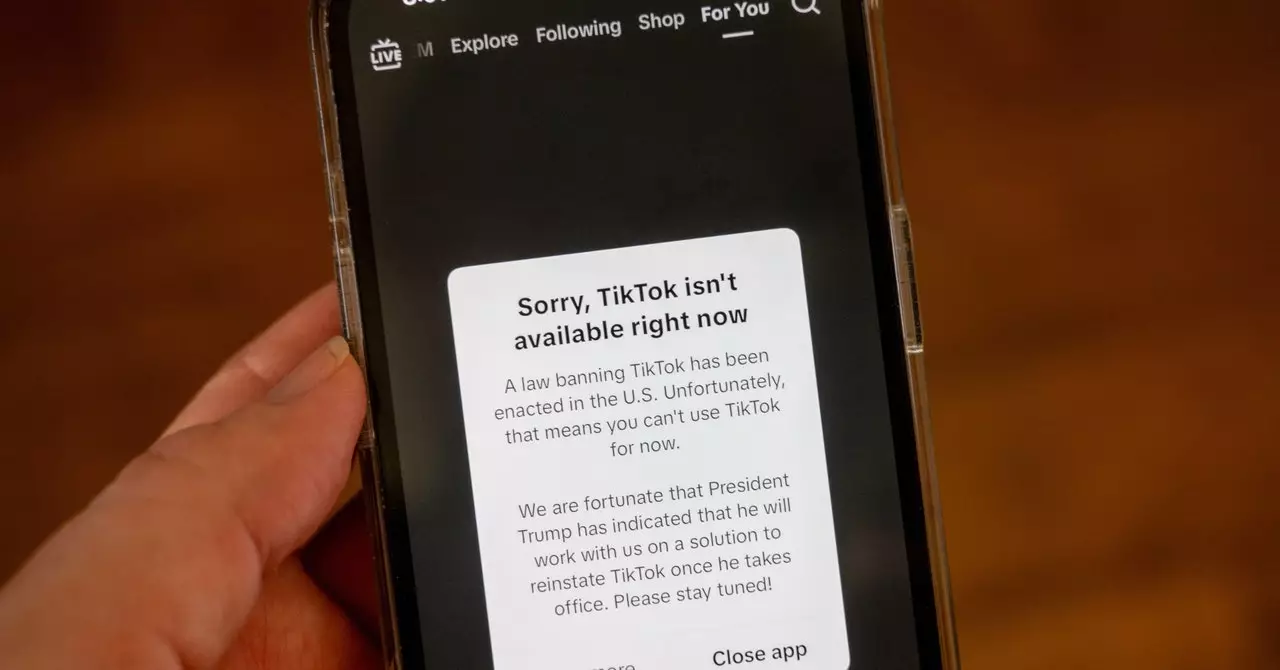TikTok, the popular social media platform owned by Chinese company ByteDance, has been embroiled in controversy since its inception in the United States. The struggle has intensified in recent days, shedding light on the intricate relationship between technology, national security, and free speech. With President-elect Donald Trump’s recent assurances to TikTok’s service providers, the app’s future appears to hang in the balance, raising crucial questions about the ways in which governments interact with digital platforms.
Reassurance Amid Uncertainty
In an unexpected twist, TikTok announced it was restoring service less than a day after concerns over its potential ban loomed large. This revival followed President-elect Trump’s implicit endorsement that his administration would not enforce any immediate measures against the app. The company expressed gratitude for this clarity, emphasizing the platform’s role in promoting entrepreneurial ventures for millions of Americans. TikTok’s response highlighted the tension between safeguarding First Amendment rights and navigating the landscape of perceived threats to national security.
The situation gained further complexity when developments in Congress made it clear that TikTok’s future in the U.S. could take a dire turn if ByteDance did not divest its American operations. The legal constraints imposed on TikTok, and the company’s subsequent lawsuit rooted in First Amendment protections, underscore the challenges digital platforms face in a politically charged environment. Despite losing its Supreme Court battle, TikTok’s resilience showcases a refusal to capitulate entirely to political pressures.
The legislative backdrop for the turmoil surrounding TikTok is critical to understanding the stakes involved. A law passed by Congress mandated that ByteDance would need to divest its sizable U.S. operations by a certain deadline or face a complete ban. The initial motivation behind such stringent measures stemmed from fears about data privacy and the potential for espionage due to the app’s Chinese ownership.
As the countdown to the enforcement of this law began, major tech companies promptly took action against TikTok, indicating a serious shift in the app’s accessibility. Apple and Google removed TikTok and other ByteDance-affiliated applications from their stores, which amounted to a significant blow to the app’s user base. This corporate maneuver set the stage for Trump’s intervention — a politically charged performance that sought to position him as a protector of American interests.
With potential suitors for TikTok’s U.S. operations emerging, speculation surrounding possible acquisitions has taken center stage. Names like Elon Musk and Frank McCourt have been mentioned as potential buyers, igniting discussions about the ideal custodians for an app that boasts over 170 million American users. Critically, Trump has publicly expressed a desire for a significant U.S. ownership stake in any joint venture, arguing that with American oversight, TikTok could flourish exponentially.
This highlights a fundamental concern: the balance of power among nations in the digital age. Trump’s comments about preventing TikTok from being defunct without U.S. approval reveal a broader issue—how critical technology platforms have become in the context of global competition. The stakes are not merely financial; they extend to national security and the implications of foreign influence over U.S. citizens.
The Road Ahead: A Long-Term Solution
In the face of this turbulence, TikTok is not only contending with political pressures but also with the necessity of maintaining user trust. As glitches continue to affect user access and functionality, the commitment to protecting user data and ensuring seamless operation has never been more crucial. Despite President Trump’s assurances, the future remains uncertain as TikTok navigates the complexities of possible regulation, acquisition, or further legal battles.
The ongoing saga of TikTok epitomizes a modern struggle that encapsulates a myriad of themes: the need for data security, the significance of free speech, and the clash of national and corporate interests. The path forward will likely demand innovative solutions that align the objectives of the app, its stakeholders, and regulatory bodies. As this contentious narrative unfolds, one thing remains clear: the battleground is not solely about an app; it’s about the future of digital governance in an interconnected world.

